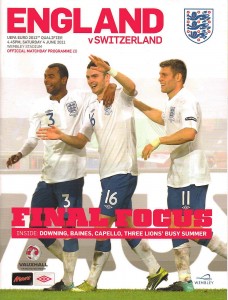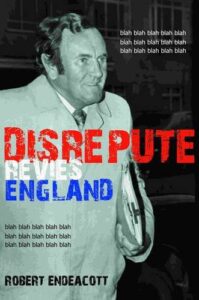2010/11: ECQ Group G – England v Switzerland (Wembley)

Sometimes you just know with England that it is not going to be easy. You get that sick feeling in the gut. A leisurely late afternoon on a sunny Saturday sat on the sofa in front of the television should have ensued for me as England took on Switzerland at Wembley, but it just wasn’t to be. Yet again it was one of those occasions when watching the national team is a disappointment.
After the tempo England displayed in their last fixtures against Ghana and Wales, you hoped that a ‘same again’ approach would be evident in securing the three points. However, it was obvious from the opening exchanges that this was not to be. The young Swiss team buzzed around and the English played short passes to each other, often without pace and usually in a backward direction. My stomach ached after 32 minutes as a floated free-kick from Barnetta eluded first Ferdinand and left Hart diving in vain as the ball crept in. A knife was twisted further into the gut just three minutes later as the two-man wall of Walcott and Wilshere parted to allow another Barnetta free-kick to embarrass Hart at his near post. A crazy five minutes was completed when Wilshire driving forward, was brought down by Djourou. Lampard put in the resulting penalty to become England’s leading scorer from the spot and put the Lions back in the game. 2-1 down at half-time, things could only get better – couldn’t they?
Well it all started so well. Ashley Young replaced Lampard for the second half and within six minutes the Villa man had levelled with a crisp finish. However, that really was about it for England. Having got back into the game, the fizz went out of the home team and they reverted to the lacklustre display of the first half. Having said that, Darren Bent had a fantastic chance to win the game but lazily blazed over the bar. As the final ten minutes were played out, the Swiss kept hold of the ball and England looked devoid of ideas once more. In the final minute of time added on Downing had a chance to win it, but only found the side netting. In truth that would have been cruel on Switzerland. England now look nervously to the evening game in Montenegro, where if the home team beat Bulgaria they will lead Group G by two points and leave England once more having work to do to qualify for the UEFA Euro 2012 tournament.
As if the 2-2 draw wasn’t enough to endure, there was then the post match Capello interview. Three years of the Italian and interviews which are still senseless and on the occasions of a poor result, full of excuses. Gabriel Clarke pounced on the limp offering from Capello that the England players were tired, with a riposte that the Swiss players didn’t looked tired and that if we qualify, twelve months hence the issue of “tiredness” does not bode well for England. As ever, more incomprehensible words from the England manager and the moment was gone. On the box, “Britain’s Got Talent” Final was up next. What had gone before had shown, England currently doesn’t have talent.

 The true story of Don Revie’s three years as England manager, 1974 – 1977; the follow-up to Dirty Leeds.
The true story of Don Revie’s three years as England manager, 1974 – 1977; the follow-up to Dirty Leeds.